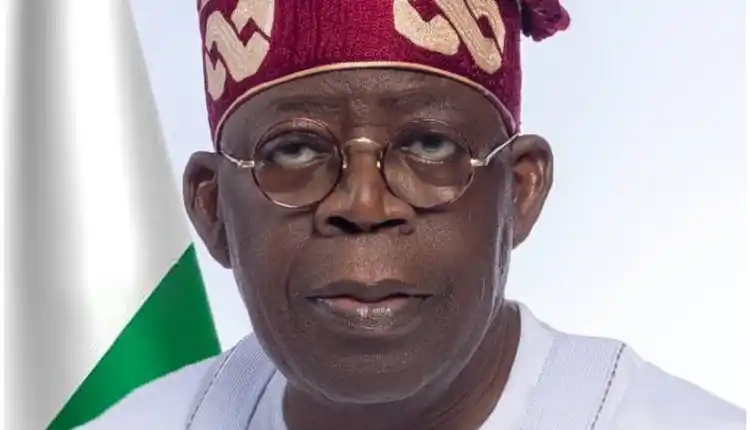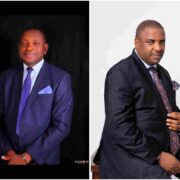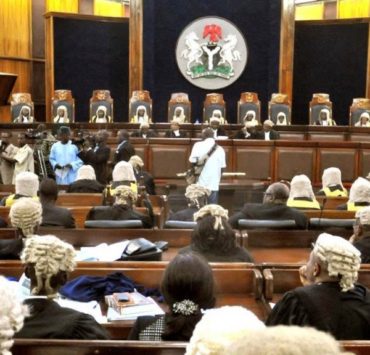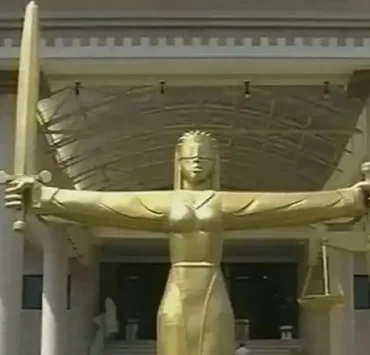Subtotal: ₦500
BREAKING: Court Dismisses Another Suit Seeking To Stop Tinubu’s Inauguration, fines petitioners

Lawyard is a legal media and services platform that provides…
A Federal High Court sitting in Abuja, has dismissed a suit seeking to stop the scheduled inauguration of President-elect Bola Tinubu of the ruling All Progressives Congress, APC, and his vice, Kashim Shettima, on May 29.
The court, in a ruling that was delivered by Justice James Omotosho, on Friday, held that it lacked the requisite jurisdiction to grant the prayer which was contained in an ex-parte application that was brought before it by three citizens who identified themselves as Concerned Nigerians.
The plaintiffs- Praise Ilemona Isaiah, Pastor Paul Isaac Audu and Dr Anongu Moses- had in their suit marked: FHC/ABJ/C5/657/2023, alleged that Tinubu, who was declared the winner of the presidential election that held on February 25, lied on oath in the Form EC9 he submitted to the Independent National Electoral Commission, INEC, in aid of his qualifications to contest the election.
The plaintiffs told the court that the President-elect falsely declared that he was not a citizen of any other country, despite the fact that he was in possession of a Guinean Passport.
On the issue of educational qualification, the plaintiffs told the court that investigations revealed that the Tinubu that attended Chicago University in the United States of America, was a female.
Besides, they alleged that whereas the President-elect claimed that he was born in 1957, it was discovered that 1952 was his actual date of birth.
They argued that Tinubu’s action was in gross violation of Section 117 of the Criminal Code Act as well as Section 156 of the Penal Code Act.
Consequently, the litigants, among other things, urged the court to order Tinubu to be arrested, detained and prevented from being sworn in, pending the determination of cases before the Presidential Election Petition Court.
They equally prayed the court to ban Tinubu from vying for any elective position for the next 10 years.
The plaintiffs told the court that they were voters that participated in the presidential election that was declared in Tinubu’s favour.
However, in its ruling, the court held that the suit was “unconstitutional, frivolous and vexatious,” adding that since the plaintiffs were bereft of the locus standi (legal right) to institute the action, it equally lacked the jurisdiction to entertain the suit.
The court stressed that under section 285 (14) of the 1999 Constitution, as amended, only an aspirant could challenge the qualification or nomination of a candidate in an election.
It further held that since the election has already been conducted, only the Court of Appeal has the jurisdiction to entertain cases arising from presidential election.
While accusing the plaintiffs of wasting judicial time of the court by filing the suit which he described as an abuse of court process, Justice Omotosho held that the legal action was in bad faith as it was aimed to expose the judiciary to ridicule.
It held that the suit, which sought to stop the inauguration that is few days away, was capable of destabilizing the democracy in the country.
Justice Omotosho said the court would not lend itself to be used as an instrument to destabilize the country.
He threatened to refer the lawyers that helped the plaintiffs to the suit to the Legal Practitioners Disciplinary Committee for instituting an action “capable of dragging the judiciary to the mud.”
Consequently, Justice Omotosho dismissed the suit and awarded a cost of N10m in Tinubu’s favour, N5m in favour of the APC and another N1m to be personally paid by counsel for the plaintiffs, to each of the respondents.
The court held that the cost awarded against the plaintiffs would attract 10% interest per annum, pending its final liquidation.
Justice Omotosho said he took the punitive measure “in view of the avalanche of frivolous suits” that have been filed by lawyers.
Lawyard is a legal media and services platform that provides enlightenment and access to legal services to members of the public (individuals and businesses) while also availing lawyers of needed information on new trends and resources in various areas of practice.

 INFRASTRUCTURE CONCESSION REGULATORY COMMISSION ESTABLISHMENT ETC ACT 2005
INFRASTRUCTURE CONCESSION REGULATORY COMMISSION ESTABLISHMENT ETC ACT 2005 










